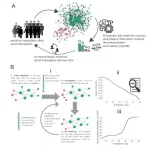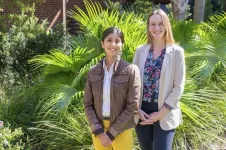(Press-News.org) There is a large window-lined laboratory in the back of one of Clemson University’s most storied buildings, Newman Hall, filled with machines that look like they were extracted straight from Dr. Jekyll’s lab. On one wall a contraption made of pullies and wires attached to the ceiling waits to drop objects and measure the impact; in the middle of the room, a giant metal base shakes a pallet of boxes in perpetuity; on the other side of the room sits what looks like a gigantic nut cracker big enough to squish a small car – but the most Medieval-looking area is the bay on the east side of the room full of machines designed to smack heads.
This is the Clemson Headgear Impact Performance (CHIP) Lab, where John DesJardins, a bioengineering professor, and Greg Batt, a food, nutrition, and packaging sciences associate professor, have spent nearly a decade working on a better way to test the strength of sports helmet faceguards.
The performance of faceguards and how it affects a helmet’s performance is woefully understudied, says DesJardins, and that’s why he and Batt created the CHIP Lab.
“The facemask connects to the helmet, and that connection is poorly studied,” he explained during a tour of the CHIP Lab on a quiet summer day on campus. “How does the rigidity of the mask affect the impact that you receive? When it gets hit, it spreads out; when it does that, it makes the helmet on your head wider, so it goes flying off. It completely changes the dynamics of the helmet. There are a lot of unknowns, and that’s why we decided to step in and bring those problems into the academic world.”
DesJardins says the project initially started with a call from Clemson graduate Jay Elmore ‘98, owner of Green Gridiron in Pendleton, the premier facemask reconditioner for top-level programs in the NFL, CFL, XFL, NCAA, semi-pro, high school and youth organizations.
“He had this machine in his facility in Pendleton and was having trouble on the engineering side keeping it up to date, doing the testing, and finding somebody qualified to operate it who was affordable enough to keep him in business,” explains DesJardins. “He said, ‘Please, take it!’ and donated the machine to us in exchange for us doing free testing for a couple of years. Ever since then, he’s been handing us boxes and boxes of facemasks.”
Batt says the CHIP Lab tests well over a 1000 masks a year as an ongoing testing service.
“Masks are made to protect from eye injuries, nose injuries, fingers coming through the mask and so on,” says Batt, noting there are about a dozen labs nationally that do this kind of testing, but the CHIP Lab is unique. “Students run the show here. They do all the testing and collect the data, and they come from a wide range of degree fields: bioengineering, packaging science, a couple of mechanical engineers, and we even have a physics major right now.”
When asked how often facemasks fail, Batt said it’s more often than one might think.
“That is an excellent question. We get some of that information from the equipment manager here for Clemson Football, Nick Yarid. He gives us his damaged masks. We might have a dozen and a half from a spring practice that don’t pass his test.”
“A good team will replace all of their masks every year just so they don’t have to worry about a potential miss, but that creates waste,” says DesJardins. “Also, many masks are over-manufactured. We’re looking at that as well. Why would you want to wear something heavier when you can wear something lighter and reduce waste?”
The original machine Elmore donated is a mean-looking device that drops a weighted human mannequin head attached to a guillotine-like blade onto a metal plate.
“It’s old-school and very low-tech,” says DesJardins. “And it’s a destructive test, which is the unfortunate aspect of it. The accelerometers measure the impact, which is not supposed to reach a certain threshold, and the facemask is not supposed to deform or intrude into the face area enough to bash your nose in or something. This test is designed to allow us to understand that, but we determined it’s really antiquated.”
DesJardins and Batt decided to invent a better, non-destructive way to get the same data.
They solicited for grant money and got a pneumatic impact ram that can smack fake heads in a much more realistic way.
“The NFL has impact standards for all the different orientations of the head and different speeds and for different player positions,” says DesJardins, picking up one of the plastic and metal heads used in the machine. “This weighs as much as a human head – about 12 pounds. You can rotate the head and the neck to different positions and angles, and there are accelerometers that measure the impact.”
DesJardins points to a large barrel attached by hinges to one side of the machine, “And just to make it super fun, you can rotate this sucker up, and it shoots hockey pucks!”
Using data gathered from whacking thousands of facemasks with the new ram, Batt and Desjardins teamed up with then-Ph.D. student Alex Bina ’22, now the director of applied science for the Clemson University Football Program, and invented a novel testing method that can put pressure on a facemask with precision and measure its strength without destroying it. They patented the technique in 2022.
“We thought, ‘What are you trying to get out of this test?’” says DesJardins. “Really, it’s taking a facemask and finding out how strong and stiff it is. We came up with a new method: a compression test that squishes it down just a little bit – about five millimeters – to determine its strength. You don’t need to bash helmets and facemasks in, which is not cheap.”
CURF, who is the technology transfer and innovation office for Clemson, filed for and received the patent (US Patent# 11,357,281). CURF also recently awarded DesJardins and Batt a Technology Maturation Grant to make a benchtop testing machine that they can market.
“Those are fancy words for, ‘You thought of it, now you have to make it,” laughs DesJardins.
The hope is the long-term influence of the data collected from their invention will make sports safer for everyone, from kids in pee-wee football to professional football and hockey players.
“Clemson University prides itself on supporting Translational Research, and the CHIP Lab embodies such a commitment,” says Bina. “I consider myself blessed because not many graduate students get to work on a multidisciplinary project at the interface between academia and industry. Combining principles of packaging science and bioengineering with industry need and technology transfer support via CURF, Dr. DesJardins and Dr. Batt allowed me to squeeze the most out of my education while developing innovative life-changing technology for a sport we all love.”
And they’re not stopping with facemasks. Batt and DesJardins already have plans to expand their research below the neck and into chest protection for athletes.
“We just received a grant to study commotio cordis, a rare disruption of heart rhythm that occurs as a result of a blow to the area directly over the heart at a critical instant during the cycle of a heartbeat,” says Batt. “Buffalo Bills safety Damar Hamlin famously collapsed from it during a Monday Night Football game in 2023.”
DesJardins says they just acquired a new instrumented torso that can record the impact force on the chest.
“Chest protection seems to be an important thing, to say the least, so we’re going to take that on next.”
END
Making an impact. Research studies a new side of helmet safety: faceguard failures
Team of Clemson professors, students patents test to make sports helmets safer
2024-11-13
ELSE PRESS RELEASES FROM THIS DATE:
Specific long term condition combinations have major role in NHS ‘winter pressures’
2024-11-13
Specific combinations of long term conditions have a major role in the additional pressures the NHS faces every winter, because they are associated with significantly higher risks of hospital admissions and death, finds research published in the open access journal BMJ Medicine.
The risk of hospital admission was 11 times higher among those with the quartet of cancer, kidney disease, cardiovascular disease, and type 2 diabetes than it was among those without any of these long term conditions, the findings show.
And ...
Men often struggle with transition to fatherhood amid lack of targeted information and support
2024-11-13
Men often struggle with the transition to fatherhood amid a lack of information and emotional support targeted to their needs, suggests a review of the available qualitative evidence, published in the open access journal BMJ Open.
Greater focus is needed in clinical practice, antenatal services, and research on men’s unique experiences of the perinatal period, which encompasses pregnancy and the first 12 months after the birth, say the researchers.
Pregnancy and childbirth can be an anxious time for new parents, and the transition to fatherhood—defined ...
More green space linked to fewer preventable deaths in most deprived areas of UK
2024-11-13
The provision of just 1% more green space in the most deprived urban neighbourhoods in 3 out of the 4 UK nations may be linked to around 40% fewer preventable deaths in these areas, finds research published online in the Journal of Epidemiology & Community Health.
Green space is unequally distributed in England, Scotland, and Northern Ireland, with the lowest amounts in the most deprived areas, the findings show, prompting the researchers to suggest that green space investment might be an important public health strategy for tackling health inequalities.
Spending time ...
Immunotherapy drug pembrolizumab improves outcomes for patients with soft tissue sarcoma
2024-11-13
Addition of the immunotherapy drug pembrolizumab to standard of care for patients with advanced soft tissue sarcoma of the limb significantly improved disease-free survival, according to the results of the SU2C-SARC032 clinical trial led by researchers from the University of Pittsburgh, UPMC, Duke University and Princess Margaret Cancer Centre, University Health Network.
The findings, published today in The Lancet, establish pembrolizumab as a new option for patients with this disease.
“Soft tissue sarcoma is a rare and complex disease with over 50 different subtypes, which makes it hard to study in large clinical trials,” said lead author ...
A formula for life? New model calculates chances of intelligent beings in our Universe and beyond
2024-11-13
The chances of intelligent life emerging in our Universe – and in any hypothetical ones beyond it – can be estimated by a new theoretical model which has echoes of the famous Drake Equation.
This was the formula that American astronomer Dr Frank Drake came up with in the 1960s to calculate the number of detectable extraterrestrial civilisations in our Milky Way galaxy.
More than 60 years on, astrophysicists led by Durham University have produced a different model which instead focuses on the conditions created by the acceleration of the Universe's expansion and the amount ...
Could a genetic flaw be the key to stopping people craving sugary treats?
2024-11-13
The work provides novel genetic insights into dietary preferences and opens the possibility of targeting SI to selectively reduce sucrose intake at the population level.
The study was led by Dr. Peter Aldiss, now a group leader in the School of Medicine at the University of Nottingham, alongside Assistant Professor Mette K Andersen, at the Novo Nordisk Foundation Centre for Basic Metabolic Research in Copenhagen and Professor Mauro D’Amato at CIC bioGUNE in Spain and LUM University in Italy. It also involves scientists internationally from Copenhagen, Greenland, Italy and Spain as part of the ‘Sucrase-isomaltase working group’.
Dr Aldiss said: “Excess ...
Experts urge complex systems approach to assess A.I. risks
2024-11-13
[Vienna, November 13, 2024] — With artificial intelligence increasingly permeating every aspect of our lives, experts are becoming more and more concerned about its dangers. In some cases, the risks are pressing, in others they won't emerge until many months or even years from now. Scientists point out in The Royal Society’s journal that a coherent approach to understanding these threats is still elusive. They call for a complex systems perspective to better assess and mitigate these risks, particularly in light of long-term uncertainties and complex interactions between A.I. and society.
"Understanding the risks of A.I. requires recognizing the intricate interplay ...
Fossil fuel CO2 emissions increase again in 2024
2024-11-13
Global carbon emissions from fossil fuels have reached a record high in 2024, according to new research by the Global Carbon Project science team.
The 2024 Global Carbon Budget projects fossil carbon dioxide (CO 2) emissions of 37.4 billion tonnes, up 0.8% from 2023.
Despite the urgent need to cut emissions to slow climate change, the researchers say there is still “no sign” that the world has reached a peak in fossil CO2 emissions.
With projected emissions from land-use change (such as deforestation) of 4.2 billion tonnes, total CO2 emissions are projected to be 41.6 billion tonnes in 2024, up from 40.6 billion tonnes last year.
Over the last 10 years, fossil ...
Winners of Applied Microbiology International Horizon Awards 2024 announced
2024-11-13
The winners of the Applied Microbiology International Horizon Awards 2024 have been announced.
The prizes, awarded by the learned society Applied Microbiology International (AMI), celebrate the brightest minds in the field and promote the research, group, projects, products and individuals who continue to help shape the future of applied microbiology.
The One Health Microbiome Center at Penn State has been named as this year’s winner of the WH Pierce Global Impact in Microbiology Prize 2024.
This award acknowledges and celebrates individuals, teams, or organisations that have made groundbreaking contributions to global challenges through applied microbiology.
The One Health Microbiome ...
A toolkit for unraveling the links between intimate partner violence, trauma and substance misuse
2024-11-12
The opioid crisis has left an estimated 2.5 million people 18 and older in the U.S. with opioid use disorder, or OUD. Despite increased attention to the heavy toll taken by OUD, key risk factors such as intimate partner violence (IPV) and post-traumatic stress disorder (PTSD) are often overlooked. Both increase the risk of OUD and complicate recovery efforts.
A team of MUSC researchers led by clinical psychologists Amber Jarnecke, Ph.D., and Tanya Saraiya, Ph.D., both of the Department of Psychiatry and Behavioral ...
LAST 30 PRESS RELEASES:
Brain cells drive endurance gains after exercise
Same-day hospital discharge is safe in selected patients after TAVI
Why do people living at high altitudes have better glucose control? The answer was in plain sight
Red blood cells soak up sugar at high altitude, protecting against diabetes
A new electrolyte points to stronger, safer batteries
Environment: Atmospheric pollution directly linked to rocket re-entry
Targeted radiation therapy improves quality of life outcomes for patients with multiple brain metastases
Cardiovascular events in women with prior cervical high-grade squamous intraepithelial lesion
Transplantation and employment earnings in kidney transplant recipients
Brain organoids can be trained to solve a goal-directed task
Treatment can protect extremely premature babies from lung disease
Roberto Morandotti wins prestigious Max Born Award for pioneering research in quantum photonics
Scientists map brain's blood pressure control center
Acute coronary events registry provides insights into sex-specific differences
Bar-Ilan University and NVIDIA researchers improve AI’s ability to understand spatial instructions
New single-cell transcriptomic clock reveals intrinsic and systemic T cell aging in COVID-19 and HIV
Smaller fish and changing food webs – even where species numbers stay the same
Missed opportunity to protect pregnant women and newborns: Study shows low vaccination rates among expectant mothers in Norway against COVID-19 and influenza
Emotional memory region of aged brain is sensitive to processed foods
Neighborhood factors may lead to increased COPD-related emergency department visits, hospitalizations
Food insecurity impacts employees’ productivity
Prenatal infection increases risk of heavy drinking later in life
‘The munchies’ are real and could benefit those with no appetite
FAU researchers discover novel bacteria in Florida’s stranded pygmy sperm whales
DEGU debuts with better AI predictions and explanations
‘Giant superatoms’ unlock a new toolbox for quantum computers
Jeonbuk National University researchers explore metal oxide electrodes as a new frontier in electrochemical microplastic detection
Cannabis: What is the profile of adults at low risk of dependence?
Medical and materials innovations of two women engineers recognized by Sony and Nature
Blood test “clocks” predict when Alzheimer’s symptoms will start
[Press-News.org] Making an impact. Research studies a new side of helmet safety: faceguard failuresTeam of Clemson professors, students patents test to make sports helmets safer



